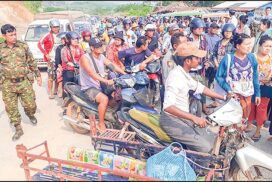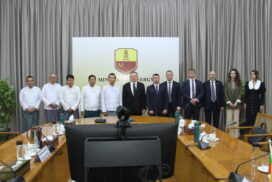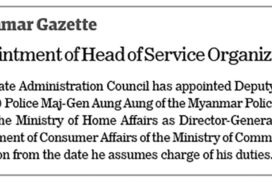U Khin Maung (A retired diplomat)
Introduction
There were a few badges of BCS officers in our union. I was the last badge of BCS recruited in the year 1962. In those days, BCS officers were invested and entrusted with some powers, such as necessary administrative officers, revenue officers and as magistrates or criminal judicial officers. In my younger days, I was very much interested to become a lawyer. So, I sat for the BL examination. I passed it in the year 1964. To the credit and fortune or good luck of my BL degree, I was called to the Ministry of Foreign Affairs in 1981. And I was assigned to serve in the International Law and Treaties Division as the Deputy Director in 1981
.
A civil officer till I retired
First and foremost, may I submit the role of civil service in any form of government? There will always be a fine balance between the civil service being neutral and non-political, and responsive. The difference between Ministers and civil servants is that Ministers look after politics getting a sense of the ground, deciding the national direction, selling policies to the public and making them work. But a minister must also be hands-on in his ministry, articulating clear strategy and making sure civil servants implement policies well.
The essential role of civil servants
The essential role of civil servants is to make sure by the Home Minister that the civil servants implement policies quite well. The Home Minister will have to provide political guidance to the civil servants to deliver results. At the same time, the Home Minister will have to provide political guidance to the civil servants to deliver results. At the same time, the Home Minister must also protect the civil servants from political interference and not involve them in political activities. The civil service is not independent of the elected government, like the judiciary. As for the civil servants, their responsibility is policy translating political goals into workable plans. The civil servants must therefore understand the political context and the thinking of the political leadership. Yet civil servants must be politically impartial. They must not campaign for or against any party, and not misuse state resources or powers for partisan purposes.
As an example of the civil service system, I would like to present to you the respective systems of the United States, Britain and China as follows: –
United States
At the federal level are not one but at least four layers of political appointees. The president is elected and appoints not just the secretaries, but deputy secretaries, assistant secretaries and deputy assistant secretaries.
Britain
The British have the classic traditional model of an impartial civil service serving whoever is the elected government of the day. For much of the 20th century, this was workable because whichever party was in power, they shared the same basic assumptions. But in recent decades, this has not been the case and the system has not worked so well.
Successive British governments introduced political advisers in the cabinet office, the Prime Minister’s office and key ministries which the Prime Minister and his senior colleagues could rely upon to develop and implement their political goals and help them reelected. The need for a great meeting between the ministers and the civil service has increased. Britain now has almost 100 special advisers.
China
Politics is in command. The Communist Party permeates the whole government. It goes all the way down to the village, the factory floor, the military unit. At every level, the party secretary calls the shots. The government leader is only second in command. At Pinnacle, there is the secretary of the party. The key decisions are made in party committees, rather than in the apparatus of the State Council.
Conclusion
There are some comments on the status of BCS or general administrative officers. The general administrative officers are commented as a jack of all trades, but master of none. I believe I am not included in that type. To the credit of my BL degree and my efforts, I was appointed as a special power magistrate and empowered to try and take all criminal cases, except for those punishable with death. And during the tenure of the “Revolutionary Council” era, I was appointed as a legal consultant and advisor to the then special tribunals. And as mentioned in the introduction of this essay, I was called to the Ministry of Foreign Affairs, due to my BL degree. I was informally addressed by the Minister for Foreign Affairs as “a legal expert”.
Reference: The Straits Times (Singapore Daily Newspaper) 27 April 2016.













